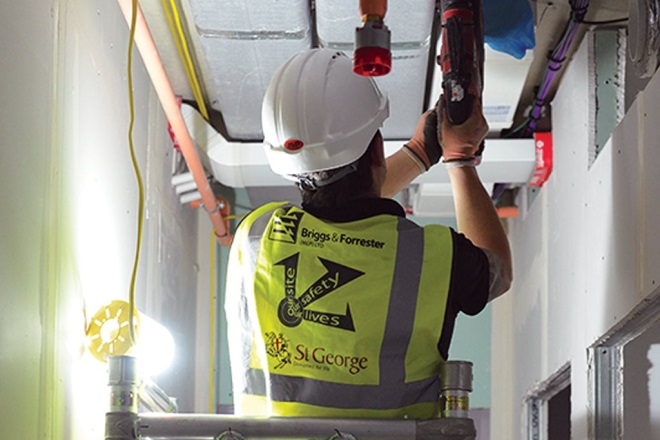Building services contractor Briggs & Forrester (B&F) caused a year-long delay on a high-rise site after it wrongly stopped work after a dispute, a High Court judge has ruled.
The CN100 firm had been contracted to revamp a smoke ventilation system at Manchester’s City Tower. But it halted its work after finding additional structural and asbestos-related issues beyond what B&F claimed was outlined in its contractual scope.
In a ruling on Monday (18 November), Judge Stephen Davies said that B&F breached its contract with BNP Paribas, the owner of the 30-storey tower, by refusing to proceed without contractual amendments for the problems.
B&F was contracted in February 2021 to revamp City Tower’s smoke ventilation system by designing and installing stair pressurisation systems on two risers. These systems, essential for fire safety, ensure stairwells remain smoke-free during emergencies. The contract, under JCT Design & Build 2016 terms, assigned B&F the risks associated with such works.
The judgement stated that at the same time that B&F found the additional issues, “tensions were [also] developing” between the firm, its subcontractor Woods and asbestos consultancy Environmental Essentials over non-payment. Following multiple work suspensions, Woods left the site permanently in December 2021.
That meant B&F could not continue the job, so it stopped work in the same month, leading to what the judge described as a “lengthy impasse”.
After more than a year of discussions, BNP said in February 2023 that it viewed B&F’s decision to stop work as the contractor giving up the contract. BNP then began legal action in November 2023, arguing that B&F had no right to terminate its work and that it constituted a “repudiatory breach of the contract”.
Judge Davies agreed, saying that B&F was responsible for unexpected asbestos removal and structural repairs. “The contract terms make it plain beyond serious argument that the risk lay firmly on B&F,” he concluded.
The judge also rejected the contractor’s argument that BNP was responsible for employer-induced delays, affirming that “the cause of the suspension was B&F’s default”.
B&F had argued the need for additional asbestos removal was an “act of prevention” by the client, preventing work completion. However, Judge Davies emphasised that the contract did not make exceptions for unforeseen asbestos or structural issues, so in his view there was “nothing in the relevant documents” to justify B&F’s refusal to proceed.
“B&F was not entitled to issue the suspension notice or the termination notice by reference to the stated grounds for doing so,” the judge said. “BNP is entitled to the declarations which it seeks.”
A determination on outstanding matters such as costs will follow.

